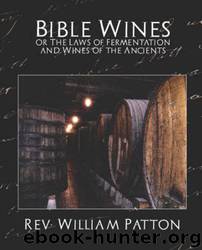Bible Wines or the Laws of Fermentation and Wines of the Ancients by Rev. William Patton

Author:Rev. William Patton
Language: eng
Format: mobi
Tags: Almanacs, Reference, General
ISBN: 9781594626623
Publisher: Book Jungle
Published: 2007-05-11T05:00:00+00:00
TESTIMONY
The following testimony, from five eminent scholars, may fortify the convictions already produced by the facts and reasonings found upon the preceding pages:
Professor George Bush - Mr. E. C. Delavan, having been referred to Professor Bush, as a learned Biblical scholar, from whom he might obtain correct information as to Bible temperance, visited him in his library, and stated to him his views on the wine question. With promptness he condemned them, and, referring to a text, he said, “This verse upsets your theory.” When asked to refer to the original, he did so, and, with amazement, said, “No permission to drink intoxicating wine here. I do not care about wine, and it is very seldom that I taste it, but I have felt until now at liberty to drink, in moderation, from this verse. ” Being entreated to make this a subject of special and particular examination, he said he would. At a subsequent visit he thus greeted Mr. Delavan: “You have the whole ground, and, in time, the whole Christian world will be obliged to adopt your views." At the request of Mr. Delavan, he published his views in the New York Observer (Enquirer, Aug., 1869). This testimony is the more valuable, as it is not only the result of a careful examination of the original languages, but the honest surrender to the force of evidence of a previous conviction.
Rev. D. E. Nott, late President of Union College, in his fourth lecture says: “That unintoxicating wines existed from remote antiquity, and were held in high estimation by the wise and good, there can be no reasonable doubt. The evidence is unequivocal and plenary.” “We know that then, as now, inebriety existed; and then, as now, the taste for inebriating wines may have been the prevalent taste, and intoxicating wines the popular wines. Still unintoxicating wines existed, and there were men who preferred such wines, and who have left on record the avowal of that preference.” - Nott, Lon. Ed. p. 85.
Professor Moses Stuart. - “My final conclusion is this, viz.: that, whenever the Scriptures speak of wine as a comfort, a blessing, or a libation to God, and rank it with such articles as corn and oil, they mean — they can mean - only such wine as contained no alcohol that could have a mischievous tendency, that wherein they denounce it, prohibit it, and connect it with drunkenness and revelling, they can mean only alcoholic or intoxicating wine.
“If I take the position that God’s Word and works entirely harmonize, I must take the position that the case before us is as I have represented it to be. Facts show that the ancients not only preserved wine unfermented, but regarded it as of a higher flavor and finer quality than fermented wine. Facts show that it was, and might be, drunk at pleasure without any inebriation whatever. On the other hand, facts show that any considerable quantity of fermented wine did and would produce inebriation; and also that
Download
This site does not store any files on its server. We only index and link to content provided by other sites. Please contact the content providers to delete copyright contents if any and email us, we'll remove relevant links or contents immediately.
Whiskies (Collins Gem) by dominic roskrow(45256)
Spell It Out by David Crystal(36110)
Cecilia; Or, Memoirs of an Heiress — Volume 1 by Fanny Burney(32548)
Cecilia; Or, Memoirs of an Heiress — Volume 2 by Fanny Burney(31947)
Cecilia; Or, Memoirs of an Heiress — Volume 3 by Fanny Burney(31932)
Beautiful Disaster by McGuire Jamie(25325)
Trainspotting by Irvine Welsh(21643)
Chic & Unique Celebration Cakes by Zoe Clark(20057)
The Secret History by Donna Tartt(19058)
How High Can a Kangaroo Hop? by Jackie French(18797)
Twilight of the Idols With the Antichrist and Ecce Homo by Friedrich Nietzsche(18625)
All the Missing Girls by Megan Miranda(15960)
Cat's cradle by Kurt Vonnegut(15339)
Ready Player One by Cline Ernest(14645)
For the Love of Europe by Rick Steves(13933)
Fifty Shades Freed by E L James(13233)
4 3 2 1: A Novel by Paul Auster(12377)
Crooked Kingdom: Book 2 (Six of Crows) by Bardugo Leigh(12311)
Grundlagen Kreatives Schreiben (German Edition) by Helfferich Pia(10444)
